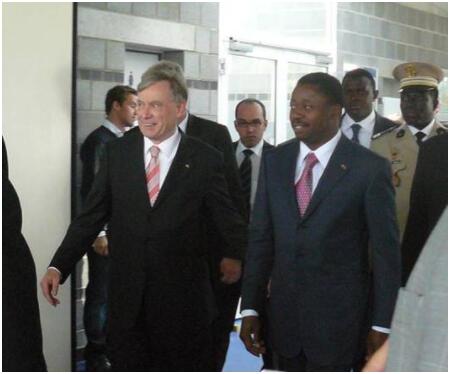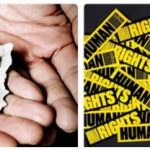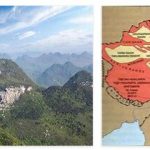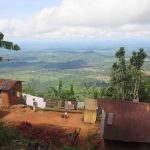Human rights
The human rights situation in Togo is precarious and in 1993 it was the reason for the break with the international community. Only after reforms under Faure Gnassingbé from 2006 onwards was the civil rights situation improved and freedom of expression and press introduced. Under Eyadema Gnassingbé, there was a climate of fear and arbitrariness against the civilian population. In May 2009, the newly established State Commission for Truth, Justice and Reconciliation, chaired by the Bishop of Atakpamé, began its work. The aim was to come to terms with the politically motivated acts of violence in Togo during Eyadema’s rule. The final report is now available. In 2009 the death penalty was also abolished.
However, political opponents are still being persecuted, which is why the opposition Tikpi Achadam, among others, had to leave the country. In 2017/18 he mobilized the population for mass protests calling for an end to the Gnassingbé family dynasty. In August 2018, the general freedom of assembly was therefore again restricted by law. In its 2019 annual report, Amnesty International reports on the excessive use of force by the security forces in breaking up political rallies and demonstrations by the opposition and civilians.
Impunity for police violence, inaccessible justice and torture of prisoners are major problems. The conditions in the country’s prisons are unbearable and do not meet international standards. Women in particular are deprived of their rights. The number of inmates exceeds the capacities of the prisons many times over, with around two thirds of the inmates being held without a legal process. On the interactive Global Slavery Index of 2018, Togo ranks 45th out of 167, as over 50,000 people live in conditions similar to slavery. Child labor is widespread and Lomé is seen as a hub for international child and human trafficking.
Homosexuality is illegal and can be punished with imprisonment and fines. In addition, there is social ostracism, which forces people to keep their sexual orientation secret.
There is a high level of acceptance of abuse and violence against women and children in the population. In 1987 the state set up the Commission Nationale des Droits de l’Homme, and in 1990 the Ligue Togolaise des Droits de l’Homme (LTDH), the first independent non-governmental organization for human rights, was founded. The universal human rights declarations have now also been translated into the national languages Ewé and Kabyé.
About 5% of women are still affected by female genital mutilation. While the circumcision of girls was banned by law in 1998, only one case has been convicted since then. Nevertheless, human rights activists have achieved further successes since then.
On November 29, 2012 in Togo’s second largest city, Sokodé, traditional circumcisers officially announced the end of the circumcision of women and girls in Togo in front of high-ranking guests. According to ehistorylib, it is the result of years of commitment by local activists and the German non-governmental organization (I) NTACT – International Action against the Circumcision of Women and Girls. The organization was founded in 1996 by the left-wing politician Christa Müller in the Saarland and has been supported by the German Federal Ministry for Development Cooperation (BMZ) since 2006.
Female genital mutilation is practiced in Togo by individual ethnic groups, but in some ethnic groups it is 85-98% widespread. These include the Cotocoli, Tchamba, Mossi, Yanga and Peulh. While the awareness campaigns in the cities have already led to a very critical stance, there are still many supporters in rural areas. This correlates with the fact that the operations are usually carried out in the villages by the traditional circumcisers.
Various international organizations continuously monitor the human rights situation and submit reports, such as the Haut Commissariat des Nations Unies aux Droits de l’Homme (HCDH). The US Department of State publishes an annual report on the human rights situation for Togo as well. The NGO European Country of Origin Information Network (ecoi.net) collects asylum-relevant information from the respective countries of origin.
Corruption
Corruption is widespread at all levels of government and is a major problem, especially in the judiciary. The high level of corruption is also a major obstacle for economic development. On the Corruption Perceptions Index 2019 published by Transparency International, Togo ranks 130th out of 180 countries examined. For several years, Togo has been falling in the ranking, although the government claims to be successfully fighting corruption. The State Commission Anticorruption CAC was set up as early as 2001.
On September 1, 2012, the former minister was Pascal Bodjona arrested. He was accused of complicity in a fraud in the course of which a businessman from the United Arab Emirates was brought for $ 48 million. In February 2016, he concluded, inter alia under pressure from the Justice of the ECOWAS free again. The government itself is accused of participating in international crime and corrupt business. Eyadema Gnassingbé has already put a large part of the proceeds from the phosphate deposits into its own pocket. After 38 years of reign, his personal fortune was valued at $ 4 billion while almost the entire population lived below any poverty line. Indian entrepreneurs based in Togo and their Togolese partners have also appeared in the Panama Papers.









